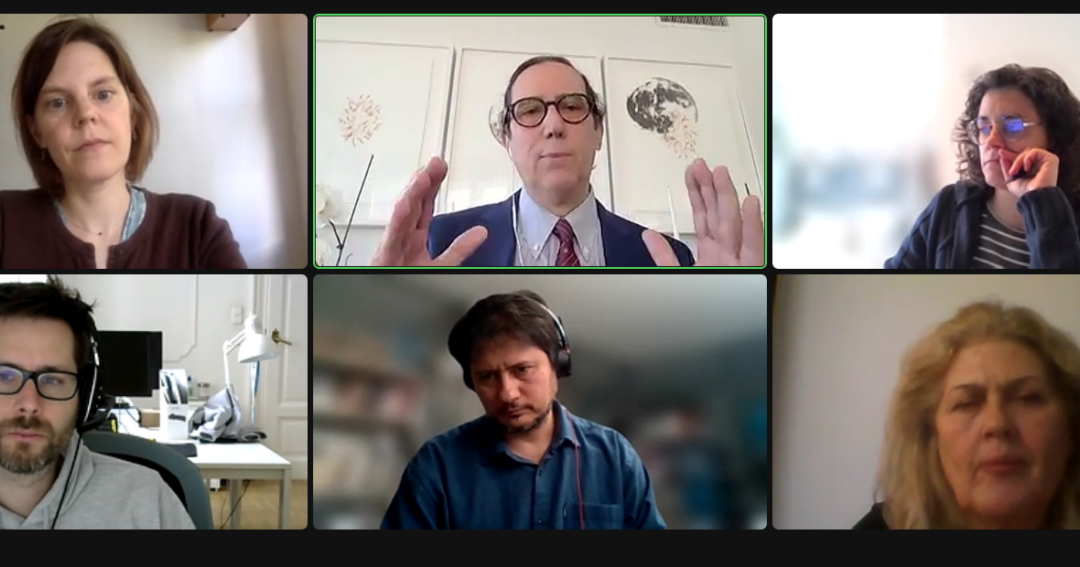
May 2, 2024 | Advocacy, Events, News, Podcasts, Video clips
On 2 May 2024, the International Commission of Jurists (ICJ) held a meeting for EU lawyers to discuss the right of judges to independence, as established by the jurisprudence of the Inter-American system.
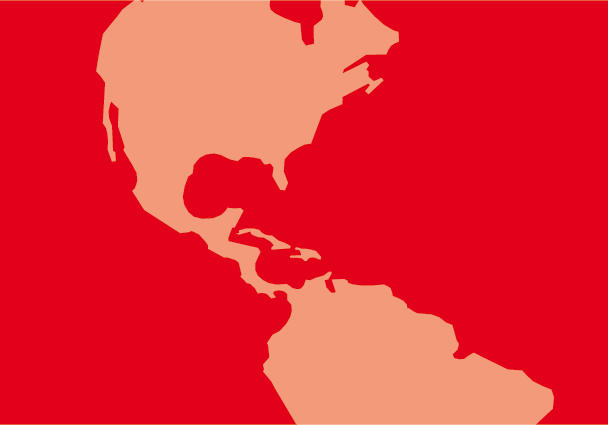
Dec 6, 2023 | News
Peru violated its obligations under international law by releasing former President, Alberto Fujimori, in blatant defiance of orders issued by the Inter-American Court on Human Rights (IACtHR) said the International Commission of Jurists (ICJ) today.
The ICJ has called for Peru to abide by its legal obligations and for effective measures by the bodies of the OAS to ensure such compliance.
The early release of Fujimori on purported humanitarian grounds, despite his failure to acknowledge any responsibility or contrition for the atrocities for which he was convicted, is an affront to the many victims and families who suffered severe abuse under his Presidential rule.
Even though the action does not formally amount to a reversal of finding of culpability or a forgiveness of crimes, Peru failed to follow procedures which would take into account the concerns of victims or to substantiate the humanitarian necessity of his release.
In 2009, Fujimori was sentenced to 25 years in prison for his role in the commission of extrajudicial executions, enforced disappearances and other acts, which cumulatively amounted crimes against humanity. On 6 December 2023, he was released by order of the Peruvian Constitutional Tribunal following an executive humanitarian pardon on 24 December 2017 issue by then-president Pedro Pablo Kuczynski Godard.
The Tribunal and President failed to take into account the victims’ rights to truth, justice, and reparations”, said Carolina Villadiego, ICJ Latin America Team Leader.
The Constitutional Tribunal’s flagrant disregard for the Inter-American Court’s explicit requirement to make this assessment is an affront to the victims of Fujimori’s crimes”, added Villadiego.
Although the human rights of convicted persons require judicial authorities to consider the impact of detention on their health, any imperative health considerations must be substantiated, and the victims must be heard, and their rights taken into account when determining whether humanitarian release should be granted.
Following issuance of the executive pardon in 2017, on 30 May 2018, the IACtHR adopted a resolution requesting the Peruvian authorities to evaluate the possibility of a judicial review of the humanitarian pardon. According to the IACtHR, that assessment should have into account, among other considerations, the right of Fujimori’s victims to have access to justice; the proportionality of the sentence imposed and its execution; the rights of Fujimori, in particular his right to life, personal integrity, and health.
The Inter-American Court already identified inconsistencies in Fujimori’s health assessment, which should have prompted domestic courts to fully inquire into the circumstances leading to the pardon and ensure the rights of all parties involved were considered”, affirmed Villadiego. The rights of victims seem to have been sidelined by both President Kuczynski and the Constitutional Tribunal, unravelling years of progress towards combating impunity in the country”, added Villadiego
The IACtHR exercises a supervisory duty over decisions related to Fujimori’s case, Barrios Altos and La Cantuta cases, in which it found Peru had violated is obligations under the American Convention on Human Rights (ACHR) by failing to hold perpetrators of gross human rights violations committed in Peru to account. Peruvian authorities are obligated to comply with the IACtHR’s decisions in this case, consistent with fundamental rule of law principles.
The ICJ underscores unequivocally that the Peruvian authorities must comply with the orders of the IACtHR. The Peruvian Constitutional Tribunal does not have the authority to disregard the IACtHR’s power to issue orders as part of its judicial function of supervising the execution of its decisions and to override those orders.
The ICJ calls on the Peruvian authorities to comply with the orders of the IACtHR and to review Fujimori’s executive humanitarian pardon. This requires an updated, thorough and impartial assessment of Fujimori’s health and consideration of the rights of Fujimori’s victims.
The ICJ also calls upon the international community, in particular members of the Organization of American States, to demand that Peru comply with the orders of the IACtHR and fulfil its international human rights obligations towards victims of serious human rights violations and crimes under international law.
Background
In 2009, the Peruvian Supreme Court convicted Alberto Fujimori for the murder of 25 people, the serious injury of four people and the kidnapping of two people, which it held amounted to crimes against humanity. As a general principle, international law and standards prohibits the issuance of amnesties and pardons for those convicted of gross human rights violations amounting to crimes under international law. International law also requires protection of the right to health of all persons, including prisoners, which in some instances could preclude institutional incarceration.
Peruvian Constitutional Tribunal’s rulings
On 4 December 2023, the Peruvian Constitutional Tribunal handed down a ruling ordering the National Penitentiary Institute to immediately release former President Fujimori, who is serving a 25-year prison sentence that is due to be completed in February 2032. The ruling was the last judicial decision triggered by a humanitarian pardon for health issues granted to Fujimori on 24 December 2017 by then-president Pedro Pablo Kuczynski Godard. Previously, on 17 March 2022, the Constitutional Tribunal had ruled that Fujimori’s humanitarian pardon should be implemented.
In the 2023 ruling, the Tribunal also stated that the IACtHR did not have the competency to rule on the non-enforcement of a national ruling as part of the IACtHR’s judicial function of supervising the execution of its decisions. This pronouncement was in reaction to the action taken on 7 April 2022, in which the IACtHR had ordered the Peruvian State not to implement the 2022 Constitutional Tribunal’s ruling.
The Tribunal’s position is contrary to the IACtHR’s faculties established in Articles 33, 62.1, 62.3 and 65 of the ACHR and Article 69 of the Rules of Procedure of the IACtHR’s. Moreover, the Tribunal’s position might imply that some actions of judicial authorities may be outside the scope of the control of conventionality, and therefore, outside the obligation established under the ACHR.
Inter-American Court of Human rights’ decisions
Before the 2009 conviction sentence against Fujimori, for the same facts, in 2001 and 2006, in the cases of Barrios Altos and La Cantuta, the IACtHR’s had found that the Peruvian state had breached its obligations under the ACHR. The IACtHR determined that Peru had violated the right to juridical personality (Article 3), the right to life (Article 4), the right the right to humane treatment (Article 5), the right to personal liberty (Article 7), and the right to a fair trial and judicial protection (Articles 8 and 25). In both cases, among other reparation measures, the IACtHR ordered Peru to identify, investigate, prosecute, and punish those responsible for human rights violations.
As part of the judicial function of supervising the implementation of its decisions, the IACtHR’s has issued several resolutions ordering measures for the full implementation of the orders in the cases of Barrios Altos and La Cantuta. Following the issuance of the humanitarian pardon in December 2017, the IACtHR’s issued a resolution on 30 May 2018 requesting the Peruvian authorities to evaluate the possibility of a judicial review of the humanitarian pardon.
For the IACtHR, this judicial review would consider: (i) the right of Fujimori’s victims to have access to justice; (ii) the proportionality of the sentence imposed and its execution; (iii) the rights of Fujimori, in particular his right to life, personal integrity and health; and (iv) the fact that prison sentences cannot be converted into death sentences. In addition, the IACtHR considered that there were serious doubts as to whether the legal requirements laid down in Peruvian law for the granting of the humanitarian pardon had been met. The IACtHR highlighted inconsistencies in Fujimori’s health assessment and allegations that the pardon was granted to give then-President Kuczynski the votes in Congress to avoid impeachment.
In addition, the IACtHR also mentioned that in cases of serious human rights violations and crimes under international law, pardons for health reasons, such as in the Fujimori case, it is necessary to take into account the health of the convicted person, but it should also be considered:
(…) [whether] a substantial part of the sentence has been served and the civil compensation imposed in the sentence has been paid; the behaviour of the convicted person with regard to the clarification of the truth; the recognition of the seriousness of the crimes committed and their rehabilitation; and the effects that early release would have on society and on the victims and their families.”
The judicial review carried out by the Peruvian Constitutional Tribunal failed to take into account any of the requirements established by the IACtHR in its resolution of 30 May 2018. As a result, on 7 April 2022 and on 5 December 2023, the IACtHR ordered the Peruvian State not to implement the decision of the Constitutional Tribunal in relation to Fujimori’s humanitarian pardon. This was done in order to guarantee the right to access to justice of the victims of the cases of Barrios Altos and La Cantuta.
Contact:
Carolina Villadiego Burbano, ICJ Latin America Team Leader, email: carolina.villadiego@icj.org
Rocío Quintero Martínez, ICJ Legal Adviser for the Latin America Programme, email: rocio.quintero@icj.org
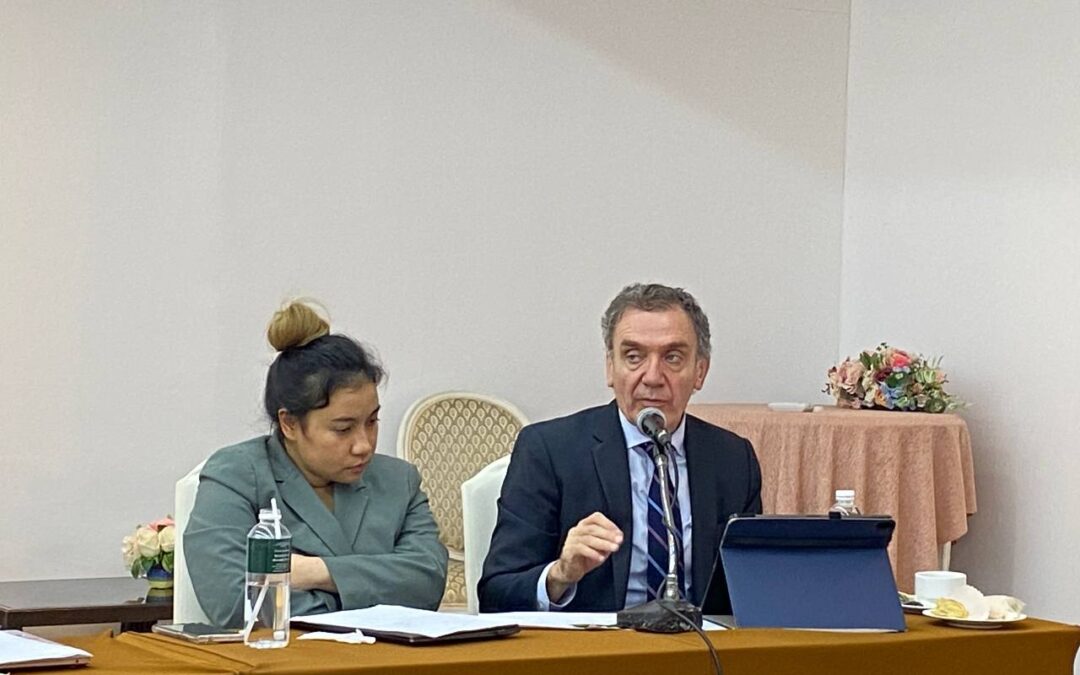
Nov 30, 2023 | Events, News
On 29 November 2023, the ICJ co-hosted a dialogue among Thai lawyers, academics, and Santiago A. Canton, Secretary General of the ICJ to exchange best practices from Latin America, specifically focusing on insights from the Inter-American Court of Human Rights and domestic courts in the region – to address ongoing challenges in litigating cases involving suspected enforced disappearances within Thai courts.
The Dialogue involved challenges encountered in litigating cases of enforced disappearances, particularly in terms of accessing, collecting, and admitting evidence within Thai courts. These challenges are notably complex, especially when the crimes have occurred beyond Thailand’s borders.
Additionally, participants discussed the difficulties related to establishing the responsibility of individuals for these serious crimes and how courts have handled evidence submitted in previous enforced disappearance cases. This included instances where evidence, such as telecommunications, as well as various forensic evidence like biological evidence and DNA evidence, was dismissed, and the failure to identify the perpetrator in cases where the victims’ bodies or remains could not be located.
“The crime of enforced disappearance completely eradicates any trace of the victim, with no acknowledgment by the authorities and no effective investigation. The requirement to locate the disappeared individuals’ bodies and remains contradicts the very nature of the crime of enforced disappearance,” said Santiago A. Canton, Secretary General of the ICJ.
While highlighting that the criteria for evaluating evidence within the Inter-American Court of Human Rights (IACtHR) are less formal compared to domestic criminal legal systems, Canton noted IACtHR’s jurisprudence relevant to the admissibility of circumstantial and indicative evidence, which was particularly instructive as enforced disappearances typically involve deliberate attempts by state officials to destroy direct evidence, aimed at securing impunity.
“The standard of proof in the Inter-American Court of Human Rights allows lawyers, under certain circumstances, to only establish a demonstrable ‘practice’ of enforced disappearances at the time of a specific case. When combined with circumstantial evidence, this can result in a judicial presumption of enforced disappearance,” said Canton.
Participants also discussed the ‘continuous nature’ of enforced disappearance crimes, which are recognized under Thai law and enable cases from the past, where the fate and whereabouts of victims remained unknown, to be prosecutable before the court, notwithstanding the fundamental principle of non-retroactivity.
Closing remarks by Angkhana Neelapaijit, a Member of the UN Working Group on Enforced or Involuntary Disappearances, whose husband Somchai Neelapaijit was a victim of enforced disappearance, detailed the role of the Working Group and the steps taken globally to address the crime.
Background
More than 20 Thai experts, lawyers, and academics, who represent or have experience researching cases of enforced disappearances in Thailand, participated in the discussion.
Thailand’s Act on Prevention and Suppression of Torture and Enforced Disappearance became effective in February 2023. However, its implementation has been slow. The majority of cases involving suspected torture, ill-treatment, and enforced disappearances are still in the investigation phase, and not yet moved into the adjudication phase. Limited information about its progress has been made available to the public.
Prior to the enactment of this new law, only two cases of apparent enforced disappearances reached Thai courts: the case of prominent Muslim lawyer Somchai Neelapaijit and Karen activist Pholachi ‘Billy’ Rakchongcharoen. Unfortunately, these cases concluded with limited success, mainly due to challenges surrounding the evidence submitted to the court.
Contact
Sanhawan Srisod, ICJ Associate International Legal Adviser, e: sanhawan.srisod@icj.org
Further reading
Thailand: a report on the criminal trial and investigation of the enforced disappearance of the Thai human rights lawyer, Somchai Neelapaichit
Ten Years Without Truth: Somchai Neelapaijit and Enforced Disappearances in Thailand
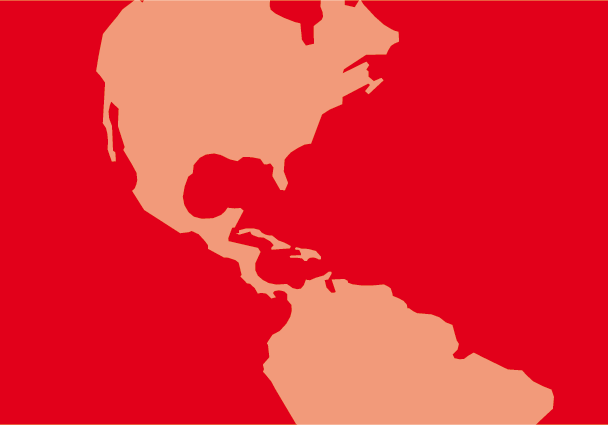
Apr 7, 2015 | News
Venezuela is intimidating and harassing human rights defenders, and making unsubstantiated allegations that they are seeking to undermine Venezuelan democracy, 28 international and Latin American human rights organizations, including the ICJ, said today.
The authorities’ allegations concern the groups’ legitimate functions of documenting abuses and representing victims before international human rights bodies.
Venezuelan authorities should cease this tactic immediately, the groups said.
Governments participating in the Summit of the Americas in Panama on April 10-11, 2015, should press the administration of Nicolás Maduro to ensure that human rights defenders can do their job without fear of reprisals, the organizations said.
The government harassment is clearly intended to discredit and intimidate groups that document human rights violations, the groups said.
On February 12, Diosdado Cabello, president of the National Assembly and member of the governing party, stated on the website of his weekly TV show, Con el Mazo Dando, aired on the state-run Venezolana de Televisión, that “NGO representatives from the Venezuelan extreme right” would participate in hearings before the Inter-American Commission on Human Rights (IACHR) in March.
Cabello had previously criticized Venezuelan human rights defenders who participated in the country’s review by the UN Committee Against Torture in Geneva, or traveled abroad to conduct advocacy meetings.
On March 18, during his show, Cabello read a list of names of individuals and organizations who had traveled to Washington, DC, to participate in the IACHR hearings.
The list included leading human rights groups such as Provea, Espacio Público (Public Space), Observatorio Venezolano de Prisiones (Venezuelan Observatory of Prisons), Transparencia Venezuela (Transparency Venezuela), Cofavic, Codevida, and Observatorio Venezolano de Conflictividad Social (Venezuelan Observatory of Social Conflicts).
Cabello accused them of receiving instructions from the US Embassy in Caracas before traveling to the hearings.
Cabello contends that the information presented on the show had been provided by anonymous “patriotic informants” (patriotas cooperantes).
Twelve human rights defenders who arrived in Caracas on various flights between March 20 and 22 have said that they were followed by unidentified men from when they landed until they left the airport, were filmed or photographed, and/or that officials irregularly searched their bags.
On March 23, María Alejandra Díaz, a lawyer who represented the government at the IACHR hearings, said on Venezolana de Televisión that “The issue of human rights is just a façade” and that nongovernmental groups that participated in the hearings “say they are Venezuelan” but “play the imperialist game” and “lie in front of the IACHR to make Venezuela look like the devil.”
An article published on April 3 in the official newspaper Correo del Orinoco accused two well-respected human rights defenders of being part of the US Central Intelligence Agency’s “Venezuelan delegation” at the Summit of the Americas.
Their objective is to “legitimize destabilization actions” in Venezuela, the article says.
Under international law, governments must ensure that human rights defenders are allowed to pursue their legitimiate activities without reprisals, threats, intimidation, harassment, discrimination, or unnecessary legal obstacles.
The Inter-American Court of Human Rights held in 2003 that “[r]espect for human rights in a democratic state depends largely on human rights defenders enjoying effective and adequate guarantees so as to freely go about their activities.”
The rights to freedom of expression and association may be subject to limitations, but the limitations must adhere to strict standards so that they do not improperly impede the exercise of those rights. Any restrictions should be prescribed by law, be necessary in a democratic society, and proportionate to the aim pursued.
In 2012, the UN special rapporteur on the rights to freedom of peaceful assembly and of association called on countries to ensure that these rights “are enjoyed by everyone and any registered or unregistered entities” and that no one is subject to “harassment, persecution, intimidation or reprisals” for exercising them.
Signatories
Amnesty International
Asociación Pro Derechos Humanos (APRODEH) (Peru)
Asociación por los Derechos Civiles (ADC) (Argentina)
Centro de Derechos Humanos de la Montaña Tlachinollan (Mexico)
Centro de Derechos Humanos Miguel Agustín Pro Juárez, A.C. (Centro Prodh) (Mexico)
Centro de Estudios de Derecho, Justicia y Sociedad (Dejusticia) (Colombia)
Center for Justice and International Law (CEJIL)
CIVICUS
Ciudadanos en Apoyo a los Derechos Humanos, A.C. (CADHAC) (Mexico)
Comisión Colombiana de Juristas (Colombia)
Comisión Ecuménica de Derechos Humanos (CEDHU) (Ecuador)
Corporación Humanas (Chile)
Coordinadora Nacional de Derechos Humanos (Peru)
Due Process of Law Foundation (DPLF)
Instituto de Estudios Legales y Sociales del Uruguay (IELSUR) (Uruguay)
Instituto de Defensa Legal (IDL) (Peru)
Instituto de Desenvolvimento e Direitos Humanos (Brazil)
International Commission of Jurists
International Federation for Human Rights (FIDH)
International Service for Human Rights (ISHR)
Frontline Defenders
Fundación Myrna Mack (Guatemala)
Fundación Regional de Asesoría en Derechos Humanos (INREDH) (Ecuador)
Human Rights Watch
Observatorio Ciudadano (Chile)
Robert F. Kennedy Center for Justice & Human Rights
Transparency International
World Organization Against Torture
Venezuela-Harassment of HRDs-News-web stories-2015-SPA (full text in PDF, Spanish version)
Venezuela-Harassment of HRDs-News-web stories-2015-POR (full text in PDF, Portuguese version)
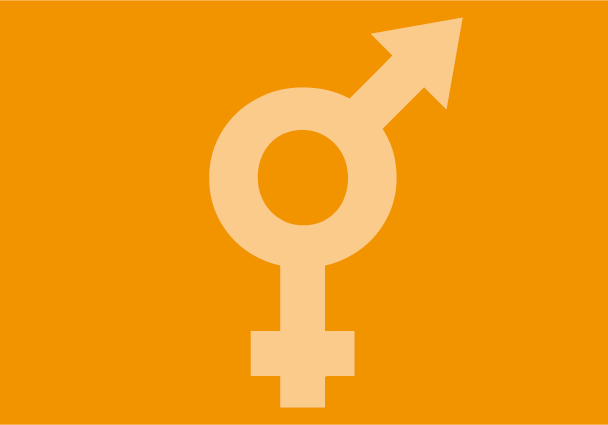
Mar 23, 2012 | News
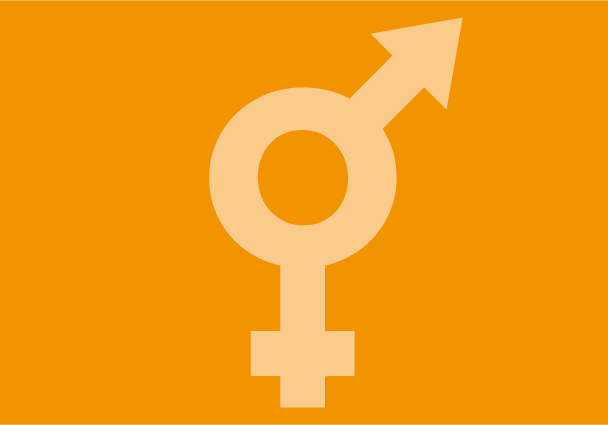 The ICJ is pleased with the decision of the Inter-American Court of Human Rights that parental sexual orientation is not a factor in child custody cases.
The ICJ is pleased with the decision of the Inter-American Court of Human Rights that parental sexual orientation is not a factor in child custody cases.
On 20 March the Inter-American Court of Human Rights ruled that parental sexual orientation is not a factor in child custody cases and that Chile had violated Karen Atala’s rights to equality, non-discrimination and privacy when the Supreme Court of Chile removed custody of her three daughters from her because she had begun a relationship with another woman.
In its first sexual orientation case, the Court held that sexual orientation is a protected ground, included under “other social condition” in Article 1 of the American Convention on Human Rights.
The Court further stated that the best interests of the child test could not be used as a pretext for prohibited discrimination in custody cases.
The Court also found that the Supreme Court of Chile’s reliance on stereotypes and prejudices was a violation of the State’s obligation to protect rights. Finally, the Court stated that the American Convention did not protect a specific form of traditional family and that states must recognize diverse family structures.
The International Commission of Jurists was called by the Inter-American Commission as an expert and submitted written and oral testimony on the role of parental sexual orientation as a factor in child custody cases.
Decision:
(http://www.corteidh.or.cr/docs/casos/articulos/seriec_239_esp.pdf)
Expert Submission:
(https://www.icj.org/dwn/database/Jernow%20Written%20Submission.pdf)










